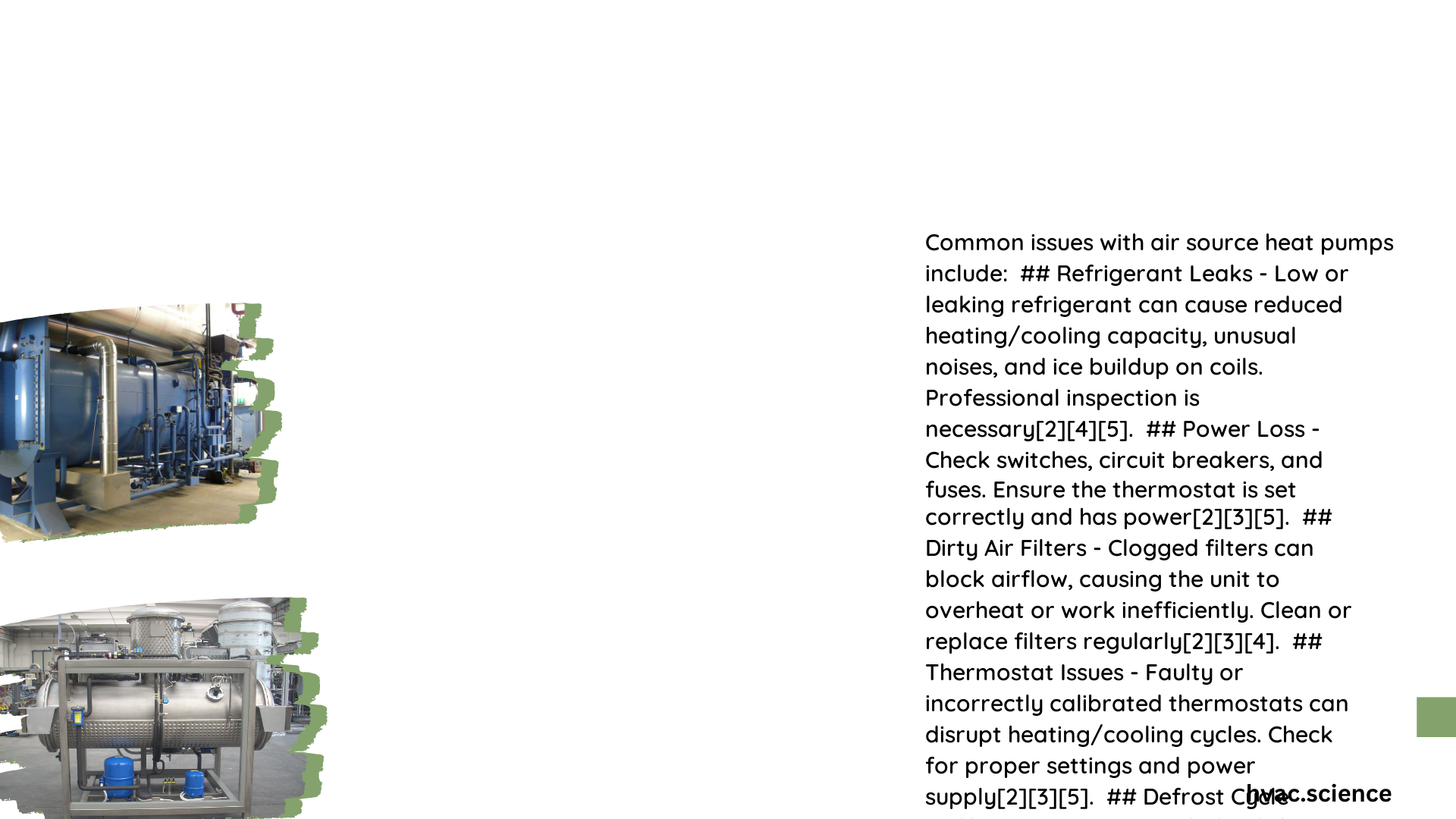Air source heat pumps are efficient heating and cooling systems, but they can encounter various issues. Common problems include noise disturbances, efficiency drops, and freezing issues. These problems can stem from environmental factors, operational conditions, and maintenance neglect. Understanding these issues and their solutions is crucial for maintaining optimal performance and longevity of air source heat pumps.
What Are the Most Common Noise Problems with Air Source Heat Pumps?
Noise issues are among the most frequent complaints from air source heat pump owners. Understanding the types of noises and their causes can help in troubleshooting and resolving these issues.
Normal Operating Noise Levels
- Standard heat pumps: 70-75 decibels
- Quietest models: 40-50 decibels
Types of Noises and Their Causes
| Noise Type | Cause | Normal/Abnormal |
|---|---|---|
| Humming/Buzzing | Electrical components | Normal |
| Whooshing | Defrost cycle | Normal |
| Whistling | Damaged ductwork | Abnormal |
| Vibrating | Improper mounting | Abnormal |
| Metal-on-metal | Loose/dirty parts | Abnormal |
| Gurgling | Low refrigerant | Abnormal |
| Shrieking | Loose parts/dirty bearings | Abnormal |
If you’re experiencing abnormal noises, it’s essential to have a professional inspect your system to prevent further damage.
Why Does the Efficiency of Air Source Heat Pumps Drop?

Efficiency drops in air source heat pumps can lead to increased energy consumption and higher utility bills. Several factors can contribute to this issue:
- Ice buildup on coils
- Extremely cold temperatures
- Low refrigerant levels
- Faulty defrost control boards
- Damaged fan motors
- Blocked airflow due to debris or clogged filters
For instance, when the heat pump’s coils are completely frozen, the system’s efficiency can drop significantly, causing it to work longer and consume more energy. In severely cold temperatures (below -15°C to -20°C), the heat output can be reduced, further impacting efficiency.
What Causes Freezing Issues in Air Source Heat Pumps?
Freezing is a common issue that can severely impact the performance of air source heat pumps. Understanding the causes and impacts can help in prevention and timely intervention.
Temperature Thresholds for Freezing
- Heat pumps can start to freeze when outdoor temperatures drop to freezing point
- The defrost cycle typically activates at freezing temperatures
- The defrost cycle usually runs until outdoor coils reach about 14°C (57°F)
Impact of Freezing on Performance
- Reduced efficiency
- Increased energy consumption
- Potential damage to mechanical parts (fan blades, refrigerant lines, coils)
- System shutdown if completely frozen
To prevent freezing issues, ensure proper maintenance and that the defrost cycle is functioning correctly.
How Often Should Air Source Heat Pumps Be Maintained?
Regular maintenance is crucial for the optimal performance and longevity of air source heat pumps. Here’s a breakdown of recommended maintenance tasks and their frequency:
Maintenance Schedule
| Task | Frequency | Estimated Cost |
|---|---|---|
| Annual maintenance check | Once a year | £50 – £150 |
| Clean/replace air filters | Every 1-3 months | £10 – £50 |
| Check refrigerant levels | Annually | £50 – £200 (if recharge needed) |
| Inspect outdoor unit | Seasonally | Part of annual check |
| Check defrost cycle | Annually | Part of annual check |
Regular maintenance can prevent many common issues and extend the lifespan of your heat pump system.
How Do Environmental Factors Affect Air Source Heat Pump Performance?
Environmental factors play a significant role in the performance of air source heat pumps. Understanding these factors can help in optimizing the system’s operation:
-
Outdoor Temperature: Low temperatures (below -15°C to -20°C) can significantly reduce efficiency and heat output.
-
Humidity Levels: High humidity can lead to condensation and freezing on heat exchanger coils, especially in cold weather.
-
Debris and Obstructions: Leaves, snow, or ice buildup around the outdoor unit can restrict airflow and reduce efficiency.
To mitigate these issues, ensure proper installation, regular maintenance, and consider additional measures like wind barriers or covers for extreme weather conditions.
What Are the Cost Implications of Neglecting Air Source Heat Pump Maintenance?
Neglecting maintenance of air source heat pumps can lead to significant cost implications:
- Increased energy bills due to reduced efficiency
- Costly repairs or replacements of damaged components
- Shorter lifespan of the overall system
For example, replacing a faulty defrost control board or damaged fan motor can cost between £100 to £500, depending on the part and labor costs. Regular maintenance, while having its own costs, can prevent these more expensive repairs and replacements in the long run.
By addressing these common air source heat pump issues through regular maintenance and timely interventions, homeowners can ensure optimal performance, energy efficiency, and longevity of their systems.
References:
1. https://sprsunheatpump.com/why-is-my-heat-pump-freezing-up-in-the-winter.html
2. https://diyhomecomfort.com/blog/heat-pump-noises
3. https://vitoservices.com/heat-pump-noises-during-winter/
